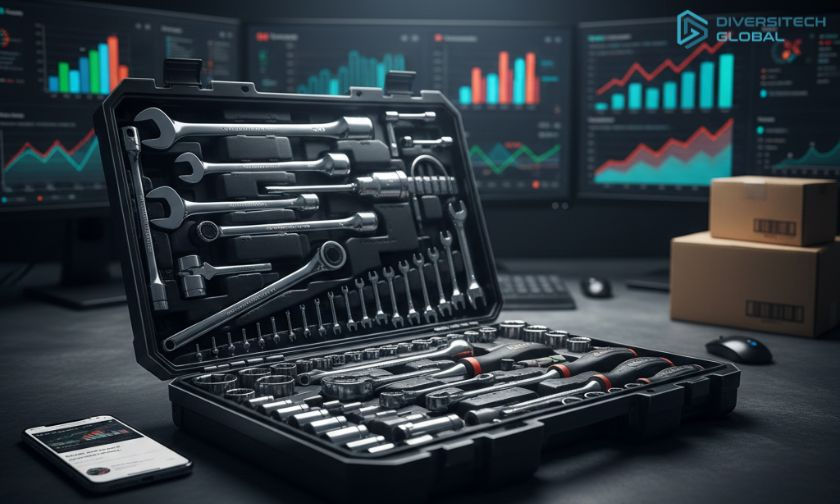How Private Label Tools Democratize the Hardware Market
- Diversitech Global

- Feb 7, 2024
- 5 min read
Updated: Feb 22, 2024

In the realm of DIY tool hardware, there has been a significant shift towards private label tools in recent years. Private label tools, also known as store brand or house brand tools, are products that are manufactured by one company and sold under the brand name of another company. This concept has had a democratizing effect on the industry, providing consumers with more affordable options without compromising on quality. In this article, we will explore the rise of private label tools and their impact on the hardware retail sector, global manufacturing, and the DIY community.
Table of Contents:
1. The Rise of Private Label Tools
Private label tools have gained traction in the market due to several factors:
Cost-effectiveness: Private label tools are typically priced lower than their branded counterparts. This affordability makes them an attractive option for budget-conscious consumers.
Quality control: Many private label tool manufacturers prioritize stringent quality control processes to ensure that their products meet or exceed industry standards.
Customization: Private label tools often provide retailers with the opportunity to customize the products to align with their specific customer base and branding.
As a result of these advantages, private label tools have experienced a surge in popularity and market share.
2. Increased Competition in the Hardware Retail Sector
The availability of private label tools has led to increased competition among hardware retailers. Here's how it has impacted the sector:
Differentiation: Retailers can differentiate themselves from competitors by offering unique private label tool lines that are not available elsewhere.
Profit margins: Private label tools often offer higher profit margins for retailers compared to branded tools, allowing them to remain competitive in pricing while maintaining profitability.
Brand loyalty: By developing a strong private label tool brand, retailers can build customer loyalty and drive repeat business.
The rise of private label tools has forced hardware retailers to adapt their strategies and offerings to stay ahead in the highly competitive market.
3. Shaping Global Manufacturing Practices
Private label tools have influenced global manufacturing practices in several ways:
Manufacturing partnerships: Retailers often partner with manufacturers, both domestic and international, to produce private label tools. This has led to the expansion of manufacturing networks and increased production capacity.
Quality standards: Private label tool manufacturers must adhere to the quality standards set by retailers. This has driven manufacturers to raise their quality control processes to meet the rigorous demands of reputable retailers.
Innovation and customization: Retailers work closely with manufacturers to introduce innovative features and customized designs in private label tools, catering to specific consumer needs and preferences.
The rise of private label tools has contributed to the evolution of global manufacturing practices, fostering collaboration and driving innovation in the industry.
4. Expanding Product Selection
Private label tool lines have expanded the product selection available to consumers. Here's how it benefits them:
Diverse options: Private label tools often provide consumers with a wider range of choices, allowing them to find products that suit their specific requirements and preferences.
Accessible pricing: The affordability of private label tools makes it easier for consumers to access quality tools without breaking the bank.
Specialized tools: Private label tool lines often include specialized tools that cater to niche markets or particular DIY projects, offering consumers more tailored solutions.
The expansion of product selection through private label tools has empowered consumers with more options and flexibility in their purchasing decisions.
5. Quality Assurance and Warranty
Private label tool manufacturers understand the importance of maintaining quality assurance and providing warranties to instill confidence in consumers:
Quality control: Private label tool manufacturers implement rigorous quality control processes to ensure that their products meet or exceed industry standards.
Warranty coverage: Retailers often provide warranties on private label tools, offering consumers peace of mind and protection against defects or malfunctions.
Customer support: Private label tool manufacturers and retailers prioritize customer support to address any issues or inquiries, ensuring a positive customer experience.
The focus on quality assurance and warranty coverage enhances the trust and satisfaction of consumers in private label tools.
Want to incorporate sustainability into your craft & art tool kits & double your sales? Get in touch
6. Collaboration with DIY Communities
Private label tool manufacturers and retailers often collaborate with DIY communities to foster engagement and loyalty:
Sponsorship and partnerships: Manufacturers and retailers sponsor DIY events, workshops, and online communities, providing tools and resources for DIY enthusiasts.
Customer feedback: Private label tool brands actively seek feedback from DIY communities to improve their products and address specific needs.
Educational content: Manufacturers and retailers create educational content, such as tutorials and guides, to support and empower DIY enthusiasts in their projects.
The collaboration with DIY communities strengthens the bond between private label tool brands and their target audience, fostering a sense of community and loyalty.
7. Environmental Considerations
Private label tools have also started to address environmental concerns in the industry:
Sustainable materials: Some private label tool brands prioritize the use of sustainable and eco-friendly materials in their manufacturing processes, reducing the environmental impact.
Packaging practices: Manufacturers and retailers are exploring sustainable packaging options, such as using recyclable materials or minimizing packaging waste.
Recycling programs: Private label tool brands are implementing recycling programs to encourage responsible disposal of tools and reduce landfill waste.
The focus on environmental considerations by private label tool brands showcases their commitment to sustainability and resonates with consumers who prioritize eco-friendly choices.
8. Consumer Perception and Trust
Private label tools have gained consumer trust and positive perception in the following ways:
Positive experiences: Consumers who have had positive experiences with private label tools are more likely to recommend them to others, contributing to positive word-of-mouth marketing.
Online reviews: The availability of online reviews and ratings for private label tools allows consumers to make informed decisions based on the experiences of others.
Brand reputation: Private label tool brands that consistently deliver quality products and excellent customer service build a strong reputation and earn the trust of consumers.
The trust and positive perception of consumers towards private label tools have contributed to their growing acceptance and market share.
9. Impact on Established Brands
The rise of private label tools has posed challenges to established brands in the following ways:
Pricing pressure: Private label tools often offer comparable quality at lower prices, putting pressure on established brands to adjust their pricing strategies.
Differentiation: Established brands must differentiate themselves through unique features, superior quality, or brand reputation to justify higher price points.
Competition for shelf space: As private label tool lines expand, established brands face increased competition for shelf space in hardware retail stores.
Established brands must adapt their strategies to stay competitive in the evolving landscape influenced by private label tools.
10. Empowered Consumers and a Changing Landscape
Private label tools have had a democratizing effect on the DIY tool hardware industry. They have empowered consumers with affordable options without compromising on quality. The rise of private label tools has increased competition among hardware retailers, shaping global manufacturing practices, expanding product selection, and prioritizing quality assurance and warranty coverage.
Collaboration with DIY communities, addressing environmental considerations, and gaining consumer trust have further contributed to their success. Established brands have faced challenges but must adapt to the changing landscape. In conclusion, private label tools have transformed the industry, offering consumers more choices and leveling the playing field for DIY enthusiasts.
Related Article: Impact of Private Labeling in the Tool Industry
Want to incorporate sustainability into your craft & art tool kits & double your sales? Get in touch




I can totally relate to the challenges of managing business tasks and staying on top of everything. Just like private label tools are changing the game by providing more accessible options for consumers, the right tools can make a huge difference for business owners. I was struggling with the same overload until I found an ai assistant for small business. It handles repetitive tasks like emails, follow-ups, and scheduling, so I can focus on the important stuff—just like how private label tools streamline choices for consumers without compromising quality.
Using AI powered assistants to handle routine inquiries and repetitive tasks has been a game changer in minimizing burnout for our agents. The seamless integration of these assistants has significantly reduced the workload for our team, allowing them to focus on more complex and meaningful tasks, check for more on https://telegra.ph/Minimizing-Burnout-How-AI-Powered-Assistants-Reduce-Agent-Workloads-by-Handling-Routine-Inquiries-and-Repetitive-Tasks-12-18 . The experience of using AI powered assistants has been nothing short of efficient and effective, providing a sense of relief and support for our agents. Overall, incorporating AI technology has been instrumental in creating a more sustainable and balanced work environment for our team.